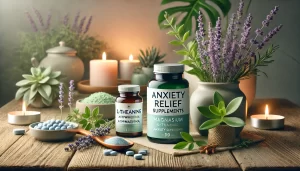Natural Supplements for Anxiety: A Path to Better Mental Health
Introduction
In today’s fast-paced world, anxiety has become a common struggle for many, affecting both mental and physical health. While traditional treatments such as therapy and medication can be highly effective, many people are turning to natural anxiety relief supplements as a complementary approach to managing their symptoms. These supplements, ranging from herbs to vitamins, offer a more holistic way to support mental well-being and reduce anxiety. In this post, we’ll explore how anxiety relief supplements can play a vital role in promoting calm, reducing stress, and supporting overall mental health as part of a balanced lifestyle.
The importance of holistic approaches to managing anxiety lies in addressing both the mind and body. Instead of relying solely on medication, holistic methods incorporate lifestyle changes, such as diet, exercise, mindfulness, and natural supplements, promoting long-term mental and emotional balance. This comprehensive approach empowers individuals to manage anxiety more effectively.
Anxiety relief supplements can complement traditional treatments, such as therapy and medication, by providing additional support for managing symptoms. Supplements like magnesium, L-theanine, and ashwagandha help regulate stress hormones and neurotransmitters, promoting relaxation and mental balance. When combined with professional care, they offer a holistic approach to anxiety management.
1. Understanding Anxiety and Its Impact on Mental Health
Anxiety is a mental health condition characterized by persistent worry, fear, or nervousness that can significantly affect daily life. Common symptoms include restlessness, where individuals feel constantly on edge, and fatigue, which occurs due to prolonged mental and emotional stress. Difficulty concentrating is another hallmark, as anxious thoughts often interfere with focus and productivity. Physical symptoms like muscle tension, headaches, and increased heart rate may also accompany these cognitive and emotional challenges.
Untreated anxiety can take a toll on mental, emotional, and physical well-being. Mentally, it can lead to constant worry, difficulty concentrating, and overwhelm. Emotionally, it often causes irritability, restlessness, and mood swings. Physically, anxiety can manifest as headaches, fatigue, muscle tension, digestive issues, and even increased risk of heart disease, diminishing overall quality of life.
Addressing anxiety holistically is essential because it involves treating the mind and body as interconnected. This approach considers not only symptoms but also lifestyle factors, such as diet, exercise, sleep, and emotional well-being. By combining natural supplements, therapy, and self-care, a holistic strategy promotes lasting, comprehensive mental health improvement.
2. What Are Anxiety Relief Supplements?
Natural supplements for anxiety relief are plant-based, herbal, or vitamin/mineral compounds used to alleviate symptoms of anxiety. These supplements, such as ashwagandha, magnesium, and L-theanine, work by promoting relaxation, reducing stress hormones, and supporting neurotransmitter balance. They offer a natural, non-prescription alternative to traditional anxiety medications.
Pharmaceutical treatments for anxiety, such as antidepressants or anti-anxiety medications, are typically prescribed by a doctor and work by altering brain chemistry to reduce symptoms. In contrast, natural supplements, like herbs and vitamins, support the body’s natural processes, offering a gentler, more holistic approach with fewer side effects but often requiring longer-term use for noticeable results.
Anxiety relief supplements can complement a broader mental health care plan by supporting the body’s natural ability to manage stress. When combined with traditional therapies like cognitive behavioral therapy (CBT), mindfulness practices, and healthy lifestyle changes, these supplements can enhance emotional balance and provide additional relief from anxiety symptoms.
3. Key Anxiety Relief Supplements That Support Mental Health
- Magnesium: Magnesium plays a crucial role in regulating the body’s stress response, helping to lower cortisol levels and relax tense muscles, which in turn promotes relaxation and calms the nervous system effectively. https://amzn.to/3O1oBCZ
- L-Theanine: L-Theanine, found naturally in green tea, promotes relaxation by increasing alpha brain waves and enhancing neurotransmitters like GABA and serotonin. It calms the mind without causing drowsiness, allowing for focused, relaxed alertness. https://amzn.to/4hEHFVf
- Ashwagandha: Adaptogens, like Ashwagandha, help the body adapt to stress by regulating cortisol, the stress hormone. By balancing cortisol levels, they promote relaxation, reduce anxiety, and enhance overall resilience to stress. https://amzn.to/3ULMuSW
- Valerian Root: Valerian root has been traditionally used for centuries to help calm anxiety and promote restful sleep. Its natural sedative properties make it a popular choice for those seeking non-pharmaceutical anxiety relief. https://amzn.to/40FcyD2
- CBD (Cannabidiol): Emerging research on CBD (Cannabidiol) shows promising anti-anxiety effects by interacting with the body’s endocannabinoid system, helping to regulate stress responses and reduce symptoms of anxiety without causing sedation.
- B Vitamins: B vitamins play a crucial role in supporting the nervous system by helping regulate neurotransmitters like serotonin and dopamine, which are essential for mood stabilization, thereby reducing anxiety and improving emotional resilience. https://amzn.to/4fhpbZx
4. How Anxiety Relief Supplements Work

Anxiety relief supplements work by influencing neurotransmitters and stress hormones, which regulate mood and stress responses. For example, supplements like magnesium and L-theanine can increase levels of GABA, a neurotransmitter that promotes relaxation. Others, like ashwagandha and CBD, help reduce cortisol, the stress hormone, lowering the body’s stress response. By balancing serotonin, dopamine, and other key neurotransmitters, these supplements can help create a calming effect, reducing anxiety and improving overall mental health.
Supplements play a key role in balancing neurotransmitters like serotonin, dopamine, and GABA, which regulate mood, stress, and anxiety. For example, magnesium and L-theanine support GABA production, promoting relaxation. 5-HTP and St. John’s Wort can increase serotonin levels, improving mood and reducing anxiety. Dopamine-boosting supplements like tyrosine enhance motivation and focus. By balancing these chemicals, anxiety relief supplements help stabilize emotional responses and reduce anxiety symptoms, supporting overall mental well-being.
5. Safety and Considerations When Using Supplements for Anxiety
Consulting a healthcare provider before starting anxiety relief supplements is crucial to ensure safety and effectiveness. A professional can help determine the right supplements based on your specific needs, avoid potential side effects, and prevent interactions with existing medications. Personalized advice ensures you’re making informed, safe choices for your mental health.
When using anxiety relief supplements, it’s essential to be aware of potential side effects, which may include digestive issues, drowsiness, or headaches. Some supplements can also interact with prescription medications, such as antidepressants or anti-anxiety drugs, altering their effectiveness or increasing the risk of adverse reactions. Always consult your healthcare provider before combining treatments.
When choosing anxiety relief supplements, it’s crucial to opt for high-quality, third-party tested products. Third-party testing ensures that the supplements are free from contaminants, accurately labeled, and meet safety standards. This guarantees that you’re getting pure, effective ingredients, providing peace of mind and better support for your mental health.
6. Incorporating Supplements Into a Holistic Anxiety Management Plan
Combining anxiety relief supplements with other anxiety-reducing techniques, such as mindfulness, therapy, and exercise, creates a holistic approach to managing anxiety. Mindfulness helps increase self-awareness, therapy addresses underlying emotional patterns, and exercise releases endorphins, promoting relaxation. Together with supplements, these practices can enhance mental resilience and long-term emotional balance.
Long-term strategies for managing anxiety include adopting a balanced lifestyle that prioritizes regular exercise, sufficient sleep, and mindful practices such as meditation or yoga. Nutrition plays a crucial role, with a focus on whole foods, healthy fats, and reducing caffeine or sugar intake. These changes help stabilize mood and promote overall mental well-being.
Consistency and patience are key when using anxiety relief supplements, as they often take time to build up in your system and show noticeable effects. Unlike quick fixes, these natural remedies work gradually, supporting long-term mental health. Sticking to a routine and allowing time for results can lead to sustainable improvement.
7. Resources for Finding High-Quality Anxiety Relief Supplements
When choosing anxiety relief supplements, it’s important to opt for trusted brands known for quality and safety. Some recommended brands include Nature’s Way, NOW Foods, and Gaia Herbs. These brands offer a range of supplements like Ashwagandha, L-Theanine, and Magnesium. You can find them at health stores or online retailers like Amazon and iHerb.
When reading supplement labels, look for transparency in ingredient lists, dosage information, and third-party testing certifications like USP or NSF. Avoid products with vague ingredient terms like “proprietary blends.” Trusted sources provide clear manufacturing standards, are GMP-certified, and offer customer reviews. Always choose reputable brands with a strong safety record.

Conclusion
In conclusion, anxiety relief supplements can be a valuable addition to your mental health toolkit, offering natural support for reducing stress and promoting emotional balance. When used alongside traditional therapies, lifestyle changes, and mindful practices, these supplements can help manage anxiety more effectively. However, it’s important to consult with a healthcare professional before starting any supplement regimen to ensure safety and effectiveness. By choosing high-quality products and incorporating them into a holistic approach, you can take meaningful steps toward better mental health and a calmer, more centered life.




